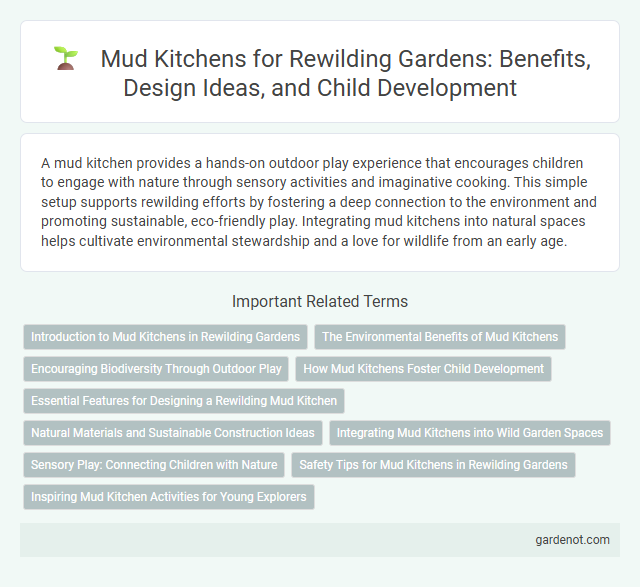A mud kitchen provides a hands-on outdoor play experience that encourages children to engage with nature through sensory activities and imaginative cooking. This simple setup supports rewilding efforts by fostering a deep connection to the environment and promoting sustainable, eco-friendly play. Integrating mud kitchens into natural spaces helps cultivate environmental stewardship and a love for wildlife from an early age.
Introduction to Mud Kitchens in Rewilding Gardens
Mud kitchens in rewilding gardens provide children with hands-on, sensory-rich experiences that foster creativity and a deeper connection to nature. These outdoor play spaces use natural materials like soil, water, and wood, encouraging imaginative role-playing and ecological learning. Incorporating mud kitchens enhances biodiversity by promoting organic interaction with the environment and supporting sustainable outdoor education.
The Environmental Benefits of Mud Kitchens
Mud kitchens promote environmental sustainability by encouraging the reuse of natural materials like soil, water, and plant matter, reducing reliance on plastic toys and minimizing waste. They foster a connection with nature, supporting soil health through playful interaction that enhances microbial diversity and promotes eco-friendly gardening practices. Exposure to natural elements in mud kitchens also cultivates environmental awareness and stewardship in children, encouraging long-term conservation efforts.
Encouraging Biodiversity Through Outdoor Play
Mud kitchens foster biodiversity by creating microhabitats that attract insects, worms, and small amphibians, enriching local ecosystems. Engaging children in outdoor play with natural materials promotes awareness and stewardship of wildlife habitats. These interactive spaces support soil health and plant diversity by encouraging natural exploration and ecological balance.
How Mud Kitchens Foster Child Development
Mud kitchens promote sensory exploration and imaginative play, essential for cognitive and motor skill development in children. Engaging with natural materials enhances creativity, problem-solving abilities, and social interaction during cooperative play. Exposure to outdoor environments through mud kitchens also supports emotional resilience and environmental awareness.
Essential Features for Designing a Rewilding Mud Kitchen
Essential features for designing a rewilding mud kitchen include natural materials such as untreated wood, stone, and clay to blend seamlessly with the environment and promote sustainability. Incorporating elements like water access, storage bins for natural items, and various utensils supports sensory play and ecological learning. Designing with flexible, modular components encourages creativity and adaptability, making the mud kitchen a dynamic space for immersive outdoor exploration.
Natural Materials and Sustainable Construction Ideas
Mud kitchens utilize natural materials such as clay, wood, and stone to create eco-friendly play spaces that encourage imaginative outdoor activities. Sustainable construction ideas include using locally sourced, biodegradable components and non-toxic finishes to minimize environmental impact. These designs promote environmental stewardship and foster a closer connection with nature through hands-on learning experiences.
Integrating Mud Kitchens into Wild Garden Spaces
Mud kitchens enhance wild garden spaces by encouraging imaginative play and fostering a deep connection with nature. Integrating natural materials such as clay, wood, and stone creates an authentic sensory environment that supports ecological learning. Positioning mud kitchens near native plants and water sources boosts biodiversity and invites wildlife interactions within the garden ecosystem.
Sensory Play: Connecting Children with Nature
Mud kitchens promote sensory play by engaging children's tactile, olfactory, and visual senses in a natural environment. This hands-on interaction with soil, water, and organic materials enhances cognitive development and fosters emotional connections with the outdoors. Sensory play in mud kitchens supports early childhood learning by encouraging creativity, fine motor skills, and environmental awareness.
Safety Tips for Mud Kitchens in Rewilding Gardens
Ensure all materials used in mud kitchens are non-toxic and free from sharp edges to prevent injuries during outdoor play. Regularly clean and inspect tools and surfaces for mold or harmful bacteria, promoting a hygienic environment. Design the mud kitchen with stable structures and proper drainage to avoid slips and water accumulation.
Inspiring Mud Kitchen Activities for Young Explorers
Mud kitchens provide young explorers with hands-on, sensory-rich experiences that enhance creativity and environmental awareness. Activities such as mixing soil, water, and natural materials encourage imaginative play while fostering a connection to nature and understanding of ecosystems. Engaging in mud kitchen play supports cognitive development and inspires stewardship in rewilding and outdoor learning environments.
Mud kitchen Infographic

 gardenot.com
gardenot.com